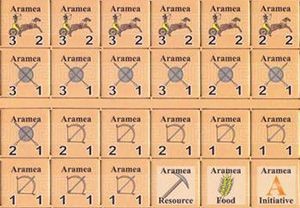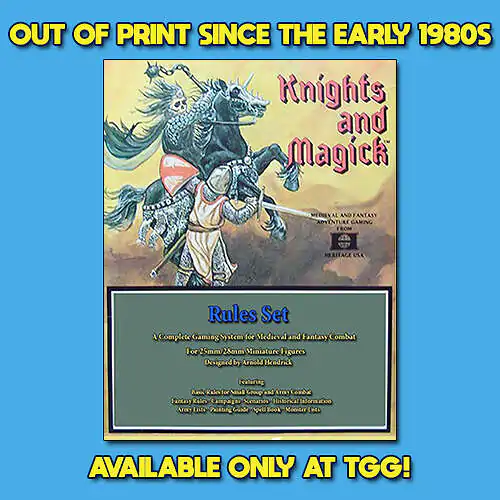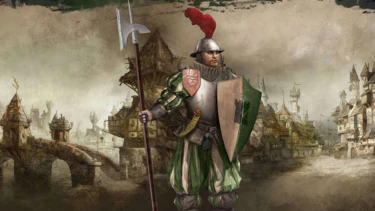
Publisher: Clash of Arms Games
Designer: Robert G. Markham
Year: 2007
Players: Two to five
Ages: 14+
Playing Time: Three to six hours
Retail Price: $55.00
Category: Hex and Counter Ancients Wargame
Components:
- Rules booklet
- One 22″ x 34″ full color, period-style maps
- 500 5/8″ counters, on three sheets
- Cardstock charts & Player aids
- Dice necessary for game play
According to traditional biblical history, about 1000 BC, a young Judean leader named David became king of a united Israelite kingdom. He then took this united army and conquered Jerusalem, making it his new capital and defeated the Israelite’s main foe of the time – the Philistines. After defeating the Philistines he then went on to subdue most of his other neighbors, creating an empire that was to flourish under his son and heir Solomon. Solomon, of course, is famous for building the First Temple setting Jerusalem on the path of being a holy city for the three great monotheistic religions of our time. After Solomon’s death the kingdom was split into the northern Israelite kingdom and the southern Judean kingdom.
This historical narrative was adopted by many of the early archeologists excavating in the Holy Land and earned them moniker Biblical Maximalists since they viewed the Bible as having great historical accuracy. Newer archeologists disputed this view, claiming that David either didn’t exist or was at most a local tribal chieftain. Instead they believed that an important northern Israelite kingdom existed during the 8th and 9th centuries BC and that only after it was destroyed in 722 BC did the kingdom of Judah and Jerusalem become important. This school of thought is called ”Low Chronology” because it attributes the importance of Judah to a later date.

The game comes with 528 counters, 6-sided, 8-sided and 10-side dice, a paper map, a 12 page rule booklet, player aids and a 12-page historical commentary booklet (yes the commentary is as long as the rules. The counters are legible but a bit thin for my taste and the dice are fine. It is unfortunate that the map is paper but the artwork on in is exceptionally good. Both the feel and the design evoke the ancient world quite nicely. The region is divided into small areas with these areas grouped into the major and minor countries with some neutral territory under no one’s control. Map colors are muted adding to the “parchment” feel. The rule book is surprisingly thorough considering its length and from what I’ve seen the lacunae are pretty well covered in the online FAQ (most questions have to do with controlling minor countries). The supplement is wonderful addition, something I would like to see in more historical games.
Each turn, representing 5 years of real time, consists of 12 phases but these phases are chosen randomly. In addition only 6 phases are revealed at the beginning of the turn the rest being revealed one at a time as first phases end. This adds uncertainty to players long-term planning, just as monarchs back then would have to deal with unexpected famines or bumper crops. There are five types of phases – the Action phase allows you to move and fight with your units, the Harvest phase allows you to gather food, the Resource phase allows you to gather material, during the Build phase you must pay food and resources to maintain your units and then you can use any surpluses to build new units or fortifications and finally the Event phase lets you draw a chit with one of 27 events each able to give you a benefit or allowing you to mess with another player.
 Unit movement is quite simple with units moving either one or two areas per action phase and combat occurs when enemy units occupy the same area. Combat itself is conducted in an unusual style. Units are moved from the regular map board to a special battle board and are lined up. One die is thrown for each unit (the type of unit determines the type of die), hits are totaled up and damage is taken until one side is eliminated or withdraws. If there is a city in the area an attacker can try and storm the city with special siege rules.
Unit movement is quite simple with units moving either one or two areas per action phase and combat occurs when enemy units occupy the same area. Combat itself is conducted in an unusual style. Units are moved from the regular map board to a special battle board and are lined up. One die is thrown for each unit (the type of unit determines the type of die), hits are totaled up and damage is taken until one side is eliminated or withdraws. If there is a city in the area an attacker can try and storm the city with special siege rules.
Another unusual aspect to combat and the game in general, is the importance of stacking rules. Normally only four units are allowed in a stack, however leaders give you the ability to stack extra units in a hex – King David can move and fight with an extra three units potentially giving him the strongest army on the board. This is the only function of leaders as they do not add any other bonuses to combat or assist in political developments.
In addition to the 5 regional powers there are a number of minor countries there to be invaded or allied with – a simple but effective bribery system lets players recreate the buying and selling of the region’s smaller countries. Seizing control of these countries, and their cities is critical to winning the game.
The game ends when one of the major powers gains control of a certain amount of cities (the amount depends on the initial strength of the major power) or after seven turns when victory is determined by the number of cities conquered weighted against the initial strength of the major power.

As befits a game called “Campaigns of King David” the designer certainly sides with Biblical maximalists – Judah is the big boy on the block with powerful units and leaders that can assemble larger armies than any of their opponents. They also face several disadvantages – they have the toughest victory conditions and start the game with few resources and food supplies. They need to expand and quickly. This lack of resources also makes them vulnerable to a Build phase where army maintenance has to be paid before they are able to build up adequate food and resources. On the other hand, this situation seems to push them into early conflict with the Philistines thus following the Biblical narrative.
From a historical point of view, there are a number of odd decisions in the way the powers are set up. Judah starts out with a large army consisting of high quality units – phalanxes in game terms. However while the Bible notes that David had a strong personal guard (the mighty men) the biblical narrative seems to imply that the Philistines were stronger and modern research indicates that they came from Greece making it more likely that they would fight in phalanxes. The Israelites on the other hand were lighter warriors based on mountain strongholds.
I also had trouble with the way the other Israelite tribes were dealt with and that is not at all. The areas traditionally controlled by these tribes are divided into a neutral zone and a minor power called Hammath. While the Judeans are given a penalty when they try to ally with some countries they don’t receive a bonus when trying to ally with their northern brethren. In the Biblical account, while there is early fighting between the Judeans under David and the northern tribes, they united pretty quickly once the rival king was eliminated by his advisors. Personally I would have preferred a weaker united Israel fighting pitted against the Philistines et al. And while I like the fact that Judah’s leadership gives them a big advantage, letting them just stack extra units seems a little “gamey.” I would like to have seen leadership effect the game in different ways.

In general, the chaos introduced by both the random events chits and the variable ordering of the phases will be a matter of taste. I personally like a little chaos in my games and the randomness of the phases is offset by the fact that you do know somewhat ahead of time what is coming up and can plan for it.
The game is also not one for mathphobes. Combat entails counting up large amounts of hits and distributing them among various units while the Harvest, Resource and Build phases entail a lot of calculations, counting up production from each area or maintenance costs for each unit. My daughter, who is a pretty hard core gamer ran from the table when I tried to introduce her to the game.
Overall, Campaigns of King David is a fun game that explores a period of history little represented in gaming. Despite my historical quibbles it does give a sense of living on the knife’s edge where you are one famine away from your kingdom melting away and I can definitely see where the diplomatic options can add another exciting dimension to play.
TGG SCORE - 8.2
8.2
Overall, Campaigns of King David is a fun game that explores a period of history little represented in gaming. Despite my historical quibbles it does give a sense of living on the knife’s edge where you are one famine away from your kingdom melting away and I can definitely see where the diplomatic options can add another exciting dimension to play.












